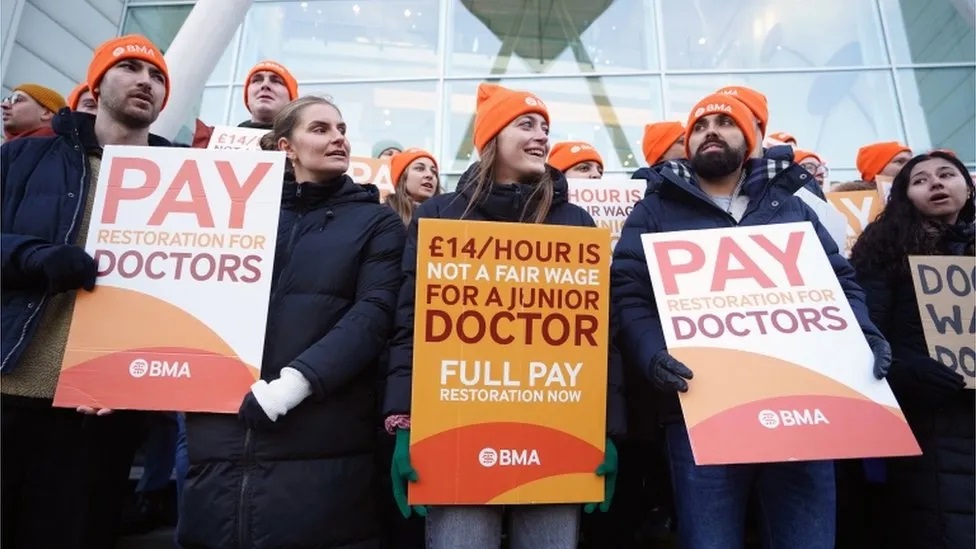

Following the breakdown of pay talks between the British government and British Medical Association (BMA), junior doctors on Wednesday started the longest-ever NHS strike.
Thousands of junior doctors, who make up nearly half the doctor workforce in the NHS, are expected to take part in the six-day walkout in England from 07:00 GMT.
There are fears that the strike will bring routine services to a virtual standstill in some areas.
The BMA says the profession needs to be better-valued.
Ahead of the strike, NHS England medical director, Prof Sir Stephen Powis, said the NHS was facing one of its most difficult year since 1948.
Sir Stephen said rising rates of respiratory illnesses, such as Covid and flu, and staff sickness were making this walkout “very challenging” in what is always one of the busiest times of the year for the health service.
Routine hospital services, such as planned operations, like hip and knee replacements and check-ups, will be hugely disrupted.
David Probert, chief executive of University College London Hospitals, said the “vast majority” of routine appointments would have to be cancelled.
This is because senior doctors are being moved across to provide cover in emergency care, according to BBC.
British doctors embark on strike over pay
There is particular concern among NHS bosses about some urgent areas of cancer care and maternity services, such as emergency caesareans.
An appeal by NHS Employers, which represents hospitals, for a strike exemption for urgent cases in these areas was rejected by the BMA.
NHS England is advising patients in a life-threatening emergency to call 999 as usual, but for everything else to use 111.
Patients who have routine appointments should attend as normal unless they have been told not to.
There is also expected to be some disruption to GP services.
Paul Farmer, of Age UK, said the timing of this set of strikes was particularly “alarming”.
“We are deeply concerned about the risk this poses to older people’s health – it will be difficult to guarantee safe and effective care for everyone who needs it,” he told BBC.
Junior doctors have taken part in 28 days of strike action in their pay dispute. The first walkout was in March last year.
Before that, other NHS staff, including nurses and ambulance staff, were involved in strike action.
Over the past year more than 1.2 million appointments and treatments have had to be cancelled because of industrial action.
The walkouts by doctors, which has also included consultants, has been by far the most disruptive.
Strike action in the NHS is also estimated to have cost more than £2 billion in planning, preparations and paying for cover.
Strike action was suspended in October to allow pay talks to take place between the government and the BMA.
But the BMA ended those talks after its deadline of early December passed without a resolution.
An offer of a pay rise averaging 3%, from January, was being discussed, which would have been on top of the average of nearly 9% junior doctors received in April.
But the BMA said that was too little – junior doctors had asked for an extra 35%, to make up for below-inflation pay rises since 2008.
Health Secretary Victoria Atkins said junior doctors should call off their strike and “come back to the negotiating table so we can find a fair and reasonable solution to end the strikes once and for all”.
BMA junior doctors committee co-chairmen Dr Robert Laurenson and Dr Vivek Trivedi said the government needed to come forward with a “credible offer”.
“Doctors would have liked to start the new year with the hope of an offer on pay that would lead to a better-staffed health service and a better-valued profession.”
Back in May, NHS staff other than doctors accepted a pay offer of 5% extra, plus a one-off lump sum, while strike action by consultants has been put on hold as they vote on a fresh offer from the government.
In Wales, junior doctors are due to take part in strike action later in January, while in Northern Ireland they are being balloted over action.
In August, a pay deal was reached with junior doctors in Scotland. It includes a 12.4% pay increase for 2023/24, in addition to a wage rise of 4.5% for 2022/23 with ministers also promising talks on future pay increases, BBC reported.
Zimbabwe held Nigeria to a 1-1 draw in a 2026 World Cup qualifier on Tuesday,…
A 37-year-old woman, Linda Stephen, on Tuesday, March 25, 2025 approached a Customary Court in…
Chewing gum releases hundreds of tiny plastic pieces straight into people's mouths, researchers have said.…
Samsung Electronics co-CEO Han Jong-hee has died of a heart attack at the age of…
Dear Senator Ojudu, Your open letter to Mallam Nasir El-Rufai, while rich in nostalgia and…
By BAYO ONANUGA Imagine a Rivers State where President Bola Ahmed Tinubu hesitated to declare…
This website uses cookies.